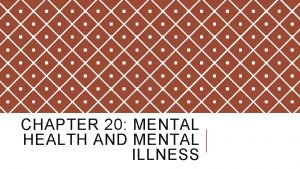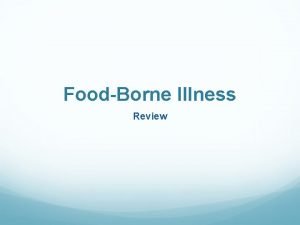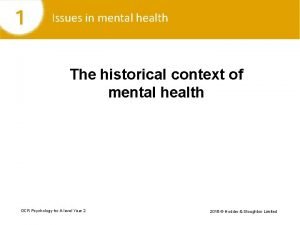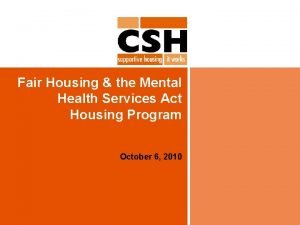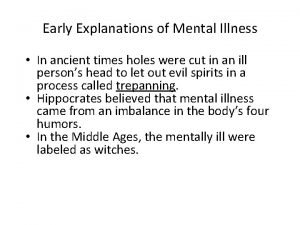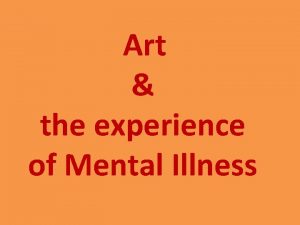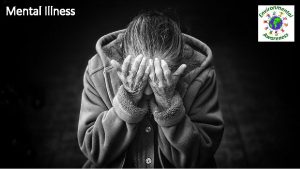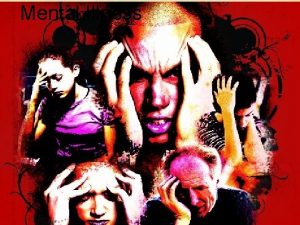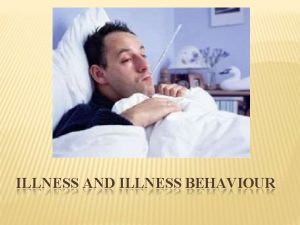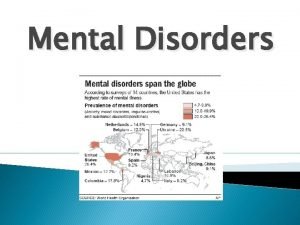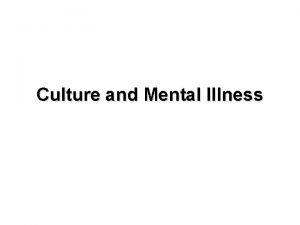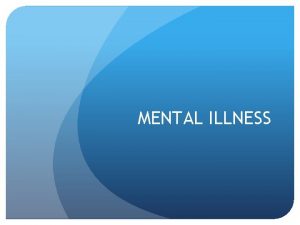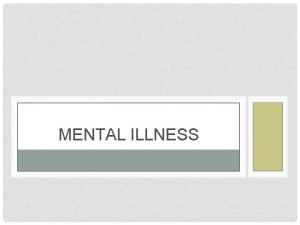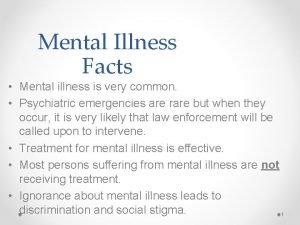MENTAL ILLNESS The term mental illnessdisorder is used









- Slides: 9

MENTAL ILLNESS The term mental illness/disorder is used to describe many different types of emotional & mental problems.

ORGANIC DISORDERS Disorders that are caused by a physical illness or injury that affects the brain. Examples: • Meningitis • Syphilis • Traumatic brain injury

FUNCTIONAL DISORDERS Disorder that occurs as a result of psychological causes/trauma in which no brain damage is involved Four Categories: • Anxiety • Somatoform • Affective • Personality

ANXIETY • Disorder in which real or imagined fears prevent a person from enjoying life – Phobia: when a person goes to extreme measures to avoid a fear – General anxiety disorder: feels anxious, fearful, and upset most of the time, but for no specific reason. (panic attacks)

OBSESSIVE COMPULSIVE DISORDER (OCD) Unreasonable need to act & think in a certain way OBSESSIVE: Persistent thoughts/ideas/voices that cause a great deal of anxiety COMPULSIVE: Urgent/repeated behaviors that when done, give a brief feeling of relief.

Common Obsessions • Washing – hands, house cleaning, etc… • Repeating – actions: locking door, turning lights on & off, etc… • Checking – power of appliances, locks, lights, etc… • Counting – generally in multiples of 5, but not always

POST TRAUMATIC STRESS DISORDER (PTSD) A person has experienced an extremely traumatic event & feels severe and long lasting after effects (i. e. flashbacks) Examples of causes: • War • Rape • Child Abuse • Witnessing a car accident (or anything in which a person is severely injured or killed)

SOMATOFORM Describes a condition in which a person complains of disease symptoms, but no physical cause can be found. Example: • Hypochondria

AFFECTIVE DISORDERS DEPRESSION • Feelings of hopelessness last for more than a few weeks and interfere with daily living • #1 cause of suicide is untreated depression MANIC DEPRESSION • A person “sways” from a depressed state to a manic state • “Cycling” is unique to each person…for some it happens in weeks, some, years
 Chapter 20 mental health and mental illness
Chapter 20 mental health and mental illness Mental health jeopardy questions
Mental health jeopardy questions Fifo is a foodborne illness
Fifo is a foodborne illness Historical views of mental illness psychology ocr
Historical views of mental illness psychology ocr Fair housing act mental illness
Fair housing act mental illness Mental illness in ancient times
Mental illness in ancient times Personality disorder vs mental illness
Personality disorder vs mental illness Mark rothko mental illness
Mark rothko mental illness Catherine earnshaw mental illness
Catherine earnshaw mental illness Americanization of mental illness
Americanization of mental illness
